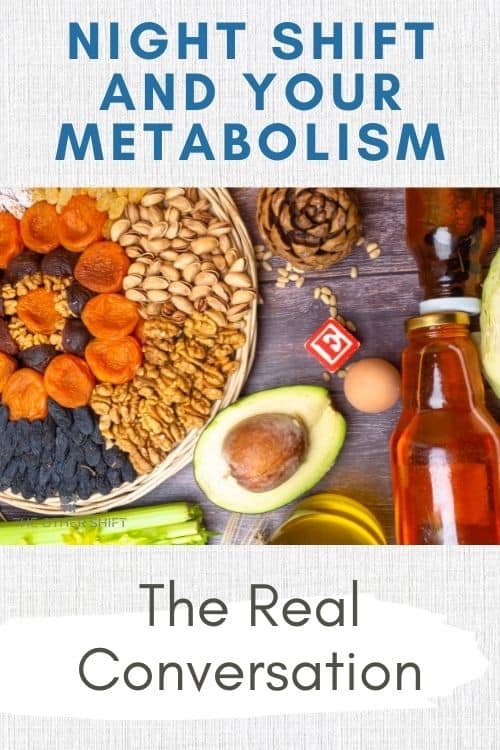Your body’s energy core runs on a circadian clock charged by the light of our sun. The different systems in your body operate on a precise schedule for optimal performance. Hormones in the brain and throughout the body are released in synchronization with your natural clock. System checks and maintenance tasks are performed at specific times of the day, this includes our metabolism.
Due to the asynchrony night shift work has on the circadian rhythm, metabolism is directly affected. The liver and pancreas don’t perform as well at night, impacting digestion. Creating a healthy eating schedule and getting enough sleep and exercise will reduce the negative effects on your metabolic rate.
However, when your sleep/wake schedule conflicts with your innate circadian rhythm, serious problems can arise. One of the most noted concerns with regard to working the night shift is the negative impact it has on your metabolism. There is a strong correlation between night shift work and issues of obesity, diabetes, and other metabolic issues.
What is Metabolism?
Your metabolism represents the engine of your body. You fuel up your body’s motor with the food and drink you consume. Using the right type of fuel for your body results in better performance. Eating the wrong type or too much food and it won’t be long before your check engine light kicks on. (source)
Your entire body’s ability to function relies on the fuel you consume to keep your engine running smoothly. Everything from being able to think clearly to having the stamina to run in a race comes from the fuel energy you ingest. While your car’s fuel tank is measured in gallons, or kilowatt-hours for you EV drivers, metabolic fuel is measured in calories.
In science speak, a calorie refers to a measurement of heat needed to raise the temperature of water. When it comes to your metabolism, think of calories as the number of gallons or kilowatt-hours your body’s fuel tank needs to run for a 24 hour period. Like tanks of differing cars, how many calories you need will depend on your body size, body style, activity level, and genetic factors. (source)
The type of calories you choose to put into your body impacts how well your engine runs. Load up on high-calorie junk food and you’ll launch off the starting blocks like a dragster race car. And just like a drag race, your fuel will be burned up in an instant. You’ll be left completely exhausted and a whole day still left to get through.
Eating the right balance of healthy calorie sources will provide the perfect intake mix for your body’s engine. You’ll keep your battery properly charged with the correct amount of energy-boosting foods. How healthy your body is, how much energy you have, and the girth of your waist are all results of the type and amount of calories you consume each day.
Related reading: Shift Work Nutrition Advice Most Are Afraid to Talk About

Metabolism and the Circadian Clock
Your metabolism has two processes it controls throughout your day. Its first job involves collecting energy from your calorie intake. During this process called anabolism, your metabolism is nurturing freshly made cells and sustaining tissues in the body. (source)
The second responsibility of your metabolism, known as catabolism, takes energy from your body’s storage. According to Healthline, This process breaks down the stored energy of your calorie intake. The heat produced from catabolism works like a furnace to keep your body warm. Catabolism recharges your battery and keeps the body’s engine firing on all cylinders.

Factors of Your Metabolism
Genetics
Your genetic makeup plays a key role in your body’s metabolic needs. Bigger people need to consume more calories than smaller people because muscle mass requires more fuel. Just like a monster truck gas tank takes more gallons to fill up its tank than the smaller tank of a Honda Civic.
And don’t try to blame getting older for all those extra pounds you’re carrying. Metabolism doesn’t slow with age as many people falsely believe. More than likely the culprits to your late-in-life weight gain are a sedentary lifestyle and poor eating habits. Slipping into bad habits is what is packed on those extra love handles.
For the older night shift nurses, this post is for you.
Diet
Maintaining a healthy metabolism takes a balanced diet. Portioned servings of hearty complex carbohydrates, lean proteins, and vitamin-packed fruits and vegetables provide a cleaner fuel for your metabolic engine to burn. Your metabolism also needs a consistent schedule of adequate fuel-ups evenly spaced throughout the day.
You can’t expect to gorge one giant meal to carry you through your workday and expect to win the race. Treat meals like NASCAR treats fuel stops, properly measured and distributed at the optimal time during the chase to the finish. That way, you’re not weighed down by the massive calorie load on the starting line and you’ll be prepared to last until the checkered flag.
Related: 3 Effective Tips for Staying Fit as a Shift Worker
Sleep
How much sleep you get and when impacts how well your metabolism functions. Your body uses the time when you’re sleeping to stabilize and maintain your blood glucose levels. Without the proper diet and amount of sleep, your blood sugar drops causing a lack of energy and inability to think clearly.
I know we are talking about food and metabolism, but I couldn’t resist giving you a small sleeping tip – wear blue light blocking glasses. Though they look unusual if you haven’t seen them before, they darn well work! The brand we love and wear every single day is Swanwick Sleep. Highly recommend!


Activity and Exercise
Fluctuations in your activity level will affect your metabolism’s energy reserves. Putting in just enough calorie fuel to burn up each day will keep your body weight maintained. Your body’s systems will gather the elements they need and nothing goes unused.
Consuming more calories in a day than your body burns up will build a surplus of storage you know as fat. Working in tandem, a reduction in activity level with continued overloading of calories leads to weight gain. Your body becomes like one of those cars you see evacuating from a hurricane with gas cans strapped on every side.
You’ve packed on more fuel than you needed and now you have to carry it around. Just like those extra gas cans, your excess storage of fat won’t go away if you keep filling your main tank with new fuel. Burning up all the excess storage will require you to move more and with greater intensity.
You will also need to cut back on your daily calorie intake in order for your metabolism to pull from your tanks. Sticking to a schedule of healthy eating, exercise, and quality sleep is the best way to keep your metabolic rate set to the optimum conditions. Your body is a machine of muscle that performs best when you treat it right.
VIDEO – Best Time To Exercise When Working Night Shift

Night Shift Effects on Metabolism
Studies have shown that the disruption to your circadian clock from night shift work has negative repercussions on your metabolism. Researchers at the National Institute of Health (NIH) looked at whether your body’s metabolites were discombobulated by the shift of the sleep/wake schedule. In this study, they took note of the hormones melatonin and cortisol to make comparisons of day and night levels.
What they found is that those metabolic components suffering the most from night shift schedules afflicted vital systems. Organs such as the liver and pancreas, part of your body’s filtering systems, don’t perform as well at night.
They also discovered that the night shift’s disruption to your metabolic clock agitates the digestive tract.
Biological processes of your body are adapted to perform at the optimal times according to the day/night cycle of our planet. Some hormones are released primarily during daylight hours. Other essential chemical reactions are secreted at night.
Working the night shift forces the body’s metabolism to adjust to the shift in your circadian rhythm. This offset of time causes an even bigger rift in the metabolic schedule. The results of which are frequently obesity, diabetes, and other digestion-related issues.
Exposure to bright light during the night hours when the body expects to be sleeping throws your body’s glucose levels into a tailspin. The lack of darkness from working at night appears to be a key factor in the disruption of glucose regulation. As a result, studies have found a propensity for being overweight and developing diabetes among night-shift workers when compared to their daytime counterparts.
More studies need to be conducted for researchers to determine why the metabolism appears to slow down in night shift workers. So far, scientists have confirmed that with all other factors controlled, like the amount of activity and calorie intake, night shift workers burn fewer calories than day shift workers. It’s safe to say that there is something significant about the time of day as it relates to your metabolism.
Related reading: Does Shift Work Make You Fat? 14 Tips to Avoid Weight Gain

Best Time to Eat Working Night Shift
Creating a scheduled meal plan is a great way for you to combat the effects the night shift has on your digestion. Developing healthy eating habits with a consistent routine will stabilize your blood sugars. Then you’ll be more alert when it’s time to work and ready to wind down when it’s time to sleep.
Working the night shift rattles both your circadian clock and your metabolic schedule. By choosing the right foods to match your wake/sleep schedule’s needs, you reduce the negative effects on your metabolic rate.
Rather than the hit and miss dining times of night shifters, adapting your dietary plan to fit the recommended 6-8 balanced meals will get you moving in the right direction
Through the method of spreading meals evenly throughout your wake period, you prevent spikes in energy levels. Keeping your dining on an even keel will also reduce those bouts of exhaustion that come from low blood sugar levels. By understanding what types of foods provide the healthiest sources of energy, you’ll be ready to plan what’s best to eat and when.
Not interested in eating overnight due to the side effects of bloating, reflux and nausea? Intermittent fasting may be the answer for you. Read more about it here.
VIDEO – Night Shift Eating Schedules Your Digestive System Will Love. This video will really help you understand eating schedules on night shift
Best Foods for Night Shift Metabolisms
Your first step to eating healthy is to stop treating the word diet like it’s a curse word. It literally means the food you eat. It’s not a form of punishment, it’s a survival skill. Learning how to use food to your advantage requires knowledge.
I’ve found that the common mistake people make when changing their diet is eliminating foods they enjoy because it’s “bad” for them. These are your no carbs, or no red meat, or no whatever this week’s food nemesis happens to be. Eggs are bad, eggs are good, eggs are bad again.
Stop blaming the foods you eat and start paying more attention to how much and how often you’re eating.
When you perceive your diet as an enemy instead of an ally, every day will be a battle.
But if you learn how to balance your fuel intake to correspond with your genetics, sleep, and activity level, you’re in harmony with nature.
Top 3 Menu Items for Healthy Night Shift Meals
Soups and casseroles
- Liquids require the least amount of effort from your digestive system. This is ideal for late-night hours when the digestive tract is most vulnerable. Your immune system relies on a healthy intestinal system.
- Ingredients are often diced up into small bites and will be broken down further from chewing.
- The temperature of hot soups and casseroles warm the body. This is especially useful when your body temperature naturally drops around the chill hour of 3 AM.
- When eating hearty casseroles at night for energy, be sure to eat in small portions to prevent overeating. Consuming too much heavy food like a casserole can lead to drowsiness.

Low Glycaemic Index (GI) Foods
- Your pancreas performs better during the day. Its job of regulating your blood glucose is crucial. Working nights means keeping a better eye on your sugar intake.
- Low GI foods break down slower and are absorbed more gradually. This slower process keeps your glucose levels stable for longer periods of time. As a result, you prevent spikes and drops like those experienced from high GI foods.
- Complex carbohydrates like oats, quinoa, and whole-grain bread provide a longer-lasting disbursement of energy. When paired with protein and fat, this type of carbohydrate gives you a better sense of feeling full. This in turn helps to curb eating too much or too often.
Other examples of low GI foods include:
- Seeds and nuts with minimal salt content
- Vegetable soup
- Healthy fats
- Butter, milk, yogurt, and cheese
- Eggs, peanuts, avocado, and Omega-3
- Coconut oil and olive oil
Want more food options? Here are some delicious snack options and here are a few more for the vegans and plant-based eaters respectively.
Hydrating foods
- Keeping your body hydrated is a key component for your body’s engine to run smoothly. Without enough water, your engine becomes sluggish, and fatigue sets in. Choose foods high in water content to help boost your reserve tanks.
- Fruits like strawberries and melons and vegetables like zucchini and other squash are great sources of hydration.

Night Shift Workers: What to Avoid
Processed foods are loaded with refined sugars. These foods will cause your glucose levels to soar because the sleepy pancreas can’t keep up. Avoid cookies, cakes, and candy at night to stave off spikes. Pasta is another food to save for daytime/bedtime dining.
Caffeine and other stimulants are not your friends so don’t trust them. Like sugar, they just create havoc on your energy levels. One minute you’re fluttering about like a cheerful hummingbird. Next thing you know, you’ve flopped in a chair barely able to keep your eyes open.
Energy drinks, even if they’re sugar-free, are loaded with who knows what chemicals to make it taste the way it does. Instead of junk food and chemicals in a can look for foods that have the natural boosting effects caffeine gives you. Interested in what else you could drink overnight? Here are a few great suggestions
Energy-Boosting Night Shift Foods
- Bananas
- Berries
- Avocado
- Spinach
- Almond or Peanut Butter
- Eggs
- Whole-grain bread, tortillas, crackers
- Supergreen TONIK (the best most uplifting green juice we have tried- see our review here)
Smoothies can be an energy-load of nutrition and protein to kick start your evening shift. Blend together a cup of milk, a banana, a handful of your favorite frozen berries, a serving of raw spinach, and an egg. If you prefer it a little sweeter add some raw honey for an added boost of health.
Olive oil is another healthy food you can slip into the most unusual places like smoothies.

Ways to Boost Your Metabolism
Your metabolic rate is the number of calories you burn up in a 24-hour period. The higher your metabolic rate, the more calories your body burns up.
Your energy levels depend on your rate of metabolization. The following are ways your can help raise your metabolic rate:
Add protein to every meal
- Raises your metabolic rate the most
- More filling to prevent overeating
- Aim for a diet that is 25-35% protein
High-intensity interval training
- Think cardio workout but faster and frequent switching of activity with spurts of rest in-between. This high-speed heart pumper burns fat faster and kicks your metabolic rate up a notch or two.
- Need some fitness motivation on nights? This video we made will definatly help.
Weight lifting
- Building muscle is another great fat-burning activity that bumps up your metabolism. Adding a routine of lifting weights opposite to your cardio days will add numerous benefits to your health.
- Maintaining or increasing your muscle mass through strength training helps with weight loss without decreasing your metabolic rate.
- Related post: Bodybuilding as a 12-Hour Shift Worker: Maximum Muscle Growth
On your feet
- Spend more of your time on your feet, especially if you have a job that involves a lot of sitting. You burn more calories standing up than when you’re seated at your desk or in your work vehicle.
- Consider getting a standing desk if you have an office job. For those who drive for a living, take every opportunity you can to be standing upright more often. I personally love this standing desk as it’s got all the accessories I want.
Add some spice to your meals
- Put some flavor and extra heat by cooking with peppers high in capsaicin. The effects may be minuscule alone, but when combined with other metabolic-boosting foods, every bit helps.
- Spicy foods won’t melt away noticeable pounds but peppers loaded with capsaicin will give a nudge to your metabolic rate.
- Just be careful adding to much spice as this can upset your stomach and cause bloating. Be cautious my friends. This video explans more.
Seafood and other fish
- Another good source of protein for boosting your metabolism is seafood. Fish high in Omega-3 fatty acids are great for boosting your metabolism. Your heart, mind, and vision will thank you for it.
Hydrate with cold water
- Your body uses energy to heat up the water you consume before it can be digested. The colder the water is, the more energy you’ll burn. Water also takes up volume in your stomach helping you to feel full.
- We use the BEAST tumbler to keep our water cold. Check out the reviews on Amazon and watch out review here.
VIDEO – What You Didn’t Know About Eating at Night
Related Questions
What other digestive issues and health problems are related to night shift work?
In addition to risks of obesity and diabetes, night shift works are more susceptible to:
- Cardiovascular disease and other coronary issues
- Systemic arterial hypertension
- Metabolic syndrome
- Sleep deprivation
This blog post talks more about this and what we can actively do about minimising our risk.
Are power bars or granola bars a good choice for snacking on night shift?
Making your own healthy versions of granola bars and energy snacks is easy and will save you money. You can also create personalized varieties of trail mix using complex carbohydrates, dried fruits, nuts, seeds, and dark chocolate for something sweet. Antioxidants found in dark chocolate boost your immunity and reduce inflammation.
Cheers,

Disclosure: This page may contain affiliate links, meaning we receive a commission if you decide to make a purchase through our links, but this is at no additional cost to you. Please read our disclosure and privacy statement for more info.
Recent Posts
An examination of the night shift professions, that while sometimes underappreciated, are necessary for civilization, in its current form, to exist. A city can be thought of as a machine. Each...
Culminated from an exhaustive yet well-funded journey into the night, this article will prepare you for life outside of work while being a denizen of the dark. During days off, night shift...

